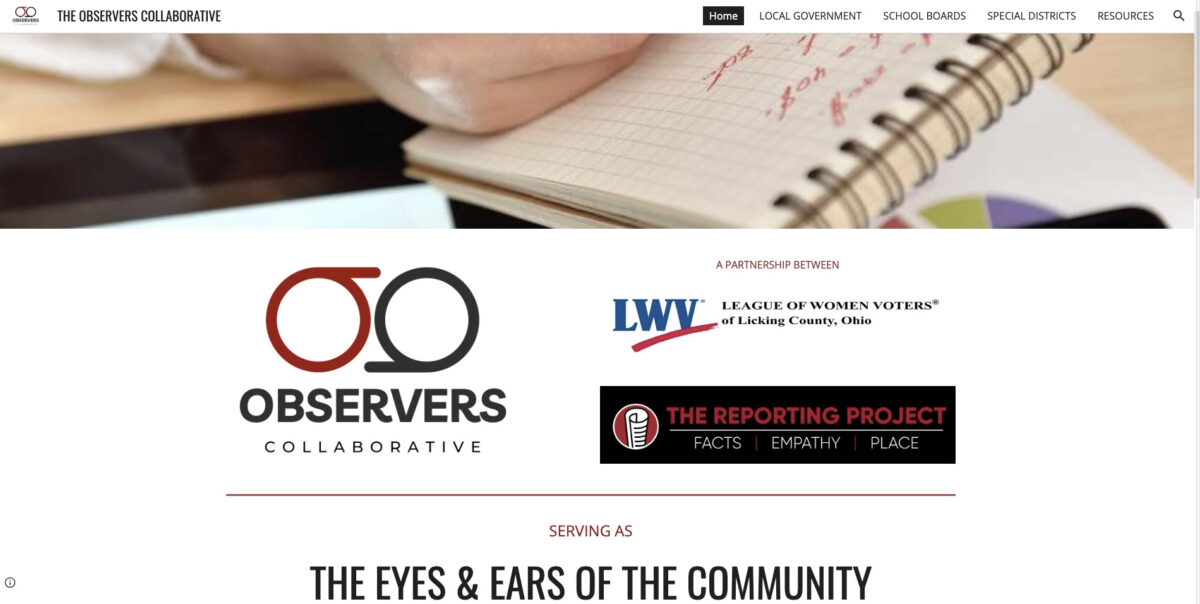If you are curious about what happened during a recent city council meeting in Licking County, but you couldn’t attend, you have a new way to find out what transpired.
It’s called The Observers Collaborative, a joint venture by the League of Women Voters of Licking County and The Reporting Project, the nonprofit news organization of the Denison University Journalism program.
Democracy works best when everyone is informed and civically engaged, said Jack Shuler, director of Journalism at Denison. And that can happen only when “what our government does is open to public scrutiny.”
“The Observers Collaborative is an excellent vehicle for doing these very things,” Shuler said.
There rarely was a time when there were enough news reporters to cover all of the public meetings in Licking County – two or three dozen meetings in any given week – and that has become even more challenging as the number of reporters in legacy newsrooms has decreased in recent years.
“We can’t be everywhere at once,” Shuler said of news reporters. “So we have to rely on the community. In the end, democracy is a community effort – and so is journalism when it’s done right.”
And that’s why it was so appealing to The Reporting Project editors when leaders of the League of Women Voters suggested that the two organizations work together to recruit and train observers to attend public meetings, write up reports on what they see and hear, and post those reports on a public website so that anyone who wants to read them can find them.
That site is observerscollaborative.org, which was built and is managed by League member Susan King.
“One of the core principles of the League is the public’s right to know,” said Mary Tuominen, president of the League of Women Voters of Licking County. “The Observers Collaborative is consistent with the mission of the League – to empower voters with information they need to be a voter.”
Tuominen noted that the League of Women Voters is nonpartisan. “We’re not affiliated with or advocating for a party. That doesn’t mean we don’t take positions on issues, such as potential ethics violations” and lack of transparency in government.
Karen Semer, a League member who has worked with fellow member Lyn Robertson to coordinate The Observers Collaborative, echoed the importance of open government and what can happen if citizens aren’t actively watching the actions of government officials.
“We don’t have to go far in the news to see other countries leaning toward autocracy,” Semer said. “Democracy needs to be protected, always and forever.”
One way that happens is through civic engagement, such as with the Observers Collaborative, which builds on an observer corps the League initiated in 2020 mainly to ensure that public bodies were following public meetings and records laws.
In their expanded role of observing not only protocol but also the topics being discussed by public officials, Observers Collaborative volunteers attend workshops to become journalistic-style trained observers.
They aren’t journalists, Tuominen pointed out, but they learn to take copious notes, ask for meeting agendas and minutes and documents related to items on meeting agendas, and to write reports about what they see and hear during public meetings.
Those meeting reports go through a review process and are posted to the Observers Collaborative website, which is free and open to the public. The goal, Semer said, is to turn around those reports within a few days of each meeting being observed.
While a shared goal of League members and local journalists is to ensure that an open government remains open to all, journalists also are looking for issues that might require a deeper look – a new policy proposal, proposed law changes or the occasional violation of Ohio’s public meetings and public records laws by local government officials.
Having observers attend as many public meetings as possible means that journalists will be more likely to hear about a greater number of possible topics for news stories, Shuler said.
About 40 people attended training sessions in Licking County in October, November and December, and observers began reporting from local meetings in January. There are still many more meetings than the number of observers available to attend them, so Semer said she hopes that when residents of Licking County see the observer reports, more will volunteer to attend meetings and report about them.
The first observer reports can be found on The Observers Collaborative website, where there is also a link for potential future observers to request more information and sign up to volunteer. A link to The Observers Collaborative reports also can be found under the news tab on The Reporting Project website.
Alan Miller writes for TheReportingProject.org, the nonprofit news organization of Denison University’s Journalism program, which is funded by the Mellon Foundation and donations from readers.

